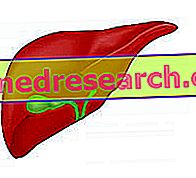What is Gilbert's Syndrome?
Gilbert's syndrome is an inherited disorder of the metabolism of bilirubin, a yellow-orange pigment derived from the catabolism of aged or damaged red blood cells. This condition, described for the first time by Gilbert and Lereboullet in 1901, is quite widespread, so much so that it affects 5-8% of the Caucasian population.
It usually occurs after puberty and is more common in men than in women; most of the time it is harmless and symptom-free, while life expectancy is completely normal.

There is therefore a slight indirect hyperbilirubinemia in people suffering from Gilbert's syndrome (see the article on bilirubin to investigate the metabolism of the substance).
Causes and transmission
The modes of origin of Gilbert's syndrome are still not completely understood. In this regard, autosomal dominant and autosomal recessive transmissions have been suggested; the latter hypothesis currently appears more plausible.
In patients with Gilbert syndrome, due to genetic mutations of the UGT1A1 gene there is an inadequate synthesis and / or activity of the enzyme "uridine diphosphogluconate glucuronyltransferase - isoform 1A1" involved in the metabolism of bilirubin.
Symptoms
Gilbert's syndrome is characterized by chronic indirect hyperbilirubinemia and modest intermittent jaundice; all without any clinical cause of morphological or functional liver disease being clinically identifiable.
Blood tests show serum levels of indirect bilirubin only slightly above normal. However, the same factors that in healthy people produce a slight rise in these values, in patients with Gilbert's syndrome lead to abnormal increases. These factors include stress, infections, prolonged fasting, taking certain medications, dehydration, menstruation and intense physical exertion.
When present, the most common symptoms of Gilbert's disease include fatigue, weakness, vague abdominal pains, dyspepsia, anorexia (de-staring) and slight yellowing of the scleras and skin (jaundice). It is important to note that these symptoms are common to other and far more serious diseases, such as hepatitis, cirrhosis, blockages in the bile ducts and tumors of the liver or pancreas; therefore, in the eventuality, it is good to immediately report them to your doctor. In about 40% of subjects with Gilbert's syndrome there is also evidence of a reduction in the average erythrocyte life.
Due to the asymptomatic nature that often accompanies it, in many cases Gilbert's syndrome is occasionally diagnosed during routine examinations, conducted to investigate the presence of other conditions or diseases.
The diagnosis is performed by a simple blood test, which in case of positivity shows mildly increased levels of indirect bilirubin, when the other markers of liver function remain normal. Since in people with Gilbert's syndrome indirect bilirubinemia varies in relation to the aforementioned factors, the test can be repeated several times or performed after a 24-hour fast. Any hepatic ultrasound will exclude any other disease, hepatocellular or biliary, potentially responsible for the symptoms experienced by the patient.
Treatment, care and precautions
Being a genetic disease, Gilbert's syndrome does not yet have adequate treatment; however, since in most cases it does not cause any problems, it generally does not require any treatment. The patient with Gilbert's syndrome is however invited to follow a lifestyle more attentive to the health of his liver, avoiding the fluoridated water (fluoride is an enzyme inhibitor) and certain food excesses (alcohol, fries, protein foods and supplements, and foods rich in fat, especially when cooked); it is also useful to learn to manage stress and try to prevent infections, even the most trivial ones (eg by washing your hands often). Furthermore, in the presence of Gilbert's syndrome, it is particularly important to inform your doctor or pharmacist before taking any medication; the enzyme deficiency can indeed amplify the side effects, including those of the common paracetamol (tachipirina). Enzymatic inducers, such as phenobarbital, can be administered to promote regression of jaundice when it causes cosmetic concerns or important psychological repercussions to the patient with Gilbert's syndrome.



